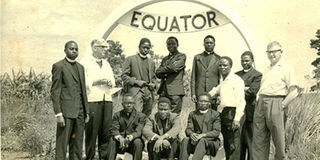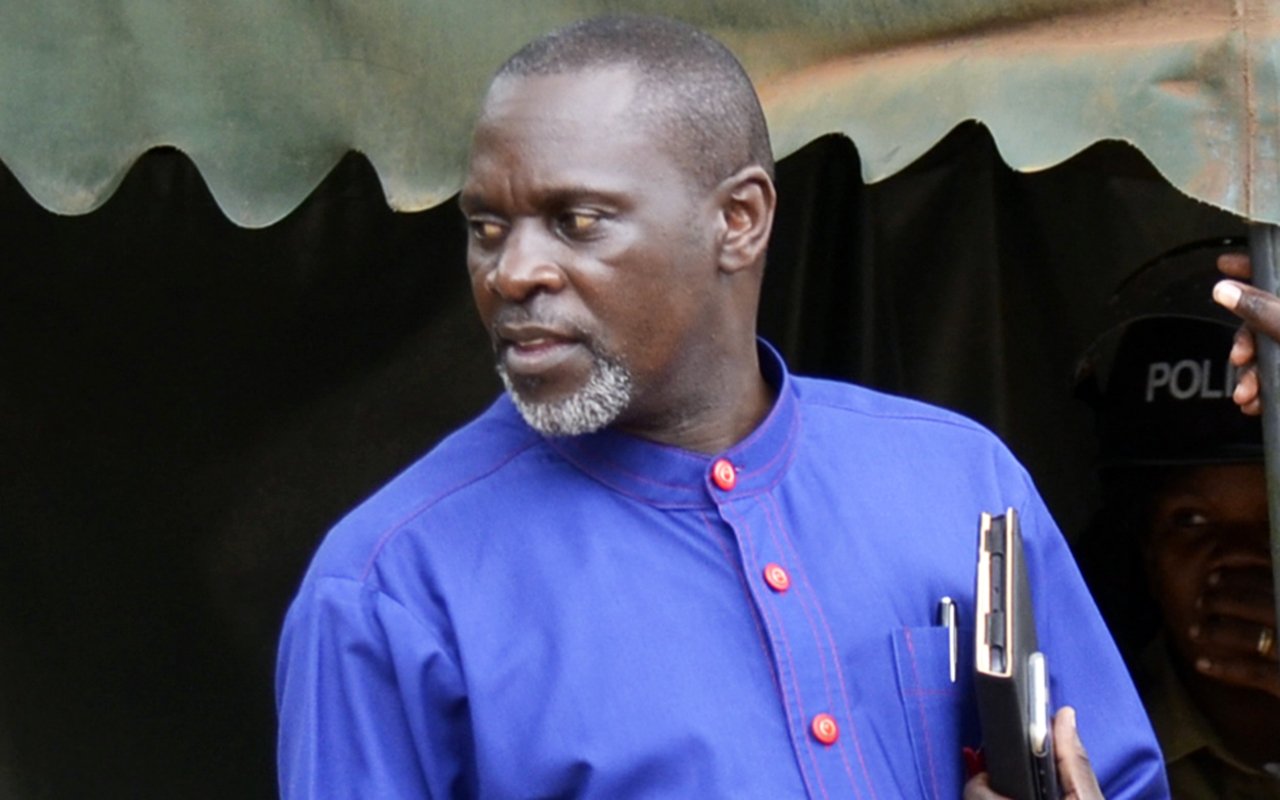Dr Peregrine Kibuuka: My life in Nyenga

Dr. Peregrine Kibuuka (Standing fourth left) with a group of seminarians and priests from Ggaba seminary at the equator on their way to Katigondo seminary. The year was 1964.
In the late 1956 “Omukulu wa seminario (the rector of the seminary) came looking for those willing to join the seminary from Namilyango parish.
Only three of us qualified for the interview. The rector was an old bald-headed white priest with bushy eyebrows. He was seated in an armchair, taking tea and breathing heavily. He seemed to cause little storms in his tea cup. I knelt by his side, as if going for confession. He looked at me, then on my baptism certificate and asked me my name, age etc.
Then he asked in Luganda: “Wali omenye ekiragiro ekyomukaaga?” (Have you ever broken the sixth commandment) “Ntya?” (How?) I asked. These were baffling questions. How does one break the sixth commandment? I am not passing this interview, I thought. The priest looked at me quizzically. Then he rephrased: Wali webaase...(Have you ever slept ?). Oh yes when our father was enlarging the house, all of us sisters and brothers used to sleep together in the sitting room. The old priest looked at me. I did not bat an eyelid! As if in despair the priest said: Good we are waiting for you at Nyenga next year!
So easily! I was surprised at my own performance. I wondered why older boys could fail such a simple interview. I had always thought they were brighter than I was. I left home knowing I was going to a holy place where I would find holy boys, very kind and considerate to each other. I had some trepidation as to whether I would manage such a composed life where one was almost to be a celestial cherubim.
I was however soon undeceived on arrival. The day was Monday February 6, 1957. I soon found out that the young seminarians were far from angelic. They were full-blooded humans with the common frailties of humans of their age. The first young seminarian I met, addressed me as follows: You newcomer, where do you come from? “Namilyango” I replied. A knock crushed on my head. Oh! The pain! The scandal! A seminarian was beating another! I cried. I remembered my mother. I felt so far away from home and wished I could escape back home. The journey to Nyenga Minor Seminary had been the longest journey I had ever made from home.
When it was time to bathe we were led to a water pump. We had to salute the pump before we could get water. The Rector’s dog came by, a black friendly dog called “Bonzo” . The newcomers had to salute the dog. Saluting anything or anybody that had made it to Nyenga Seminary before you, became the order of the day. We saluted the tractor. We saluted Brother Bosco, its driver. Br. Bosco was never aware that we were saluting him!
At the refectory, we were allocated tables, the grace before meals was led and we sat down for our first meal in the seminary. Steaming hard potatoes were in one dish and groundnut stew in another. The table prefect served. Then the nightmare of eating started. The tables had been well laid, the fork on the left, the knife on the right and the spoon behind the plate. The table prefect demonstrated what we were supposed to do, to eat like civilized people.
I got hold of the knife, then the fork and proceeded to cut into the big hard potato on my plate. The potato crumbled into “unforkable” pieces whenever I tried a second attempt of cutting it into a smaller piece, a reasonable one, to put into my mouth. After more than four attempts, I had not succeeded in manipulating any piece of potato onto the prongs of the fork. I felt helpless, yet hungry. I looked at the table prefect. He was steadily and dexterously using the fork and the knife to go through his meal.
“Try again, but no using fingers” said the table prefect, punctuating his meal with a sip on his water. I tried the knife and fork again. They behaved more like implements of demolition than utensils to sustain life with. I gave up the attempt to eat, got hold of the spoon and launched an attack on the groundnut stew.
I was more successful with the spoon. The table prefect would not countenance the same. “You pick the food with the fork, not with the spoon.” I concentrated on the groundnut stew and with a glass of water, I called it a day. The next day was uneventful. I had also refined my skills of survival in the hostile environment then for the new comers.
I constantly kept near my protege and the “young commander” could not get his hands on me. Then came Wednesday, the third day. We had evening tea. Tea was served twice a week. Wednesday and Sunday. We were told to bring all the comestibles we had brought with us from home. I parted with two to three kilograms of well- roasted nuts and took them to common table. The dean (Head prefect) then told us that as from the next day studies were going to begin seriously. We were not allowed to eat between meals, much less keep edibles or money with us.
The penalty for transgressing against any of the above was dismissal. Except for morning mass, the seminary had as yet not impressed me as different from the rest of school life. But the demand that we surrender our personal groundnuts into a common pool for all disconcerted me. The demand of communality in Christianity were practically manifesting itself to the young seminarian in a most unpleasant manner.




